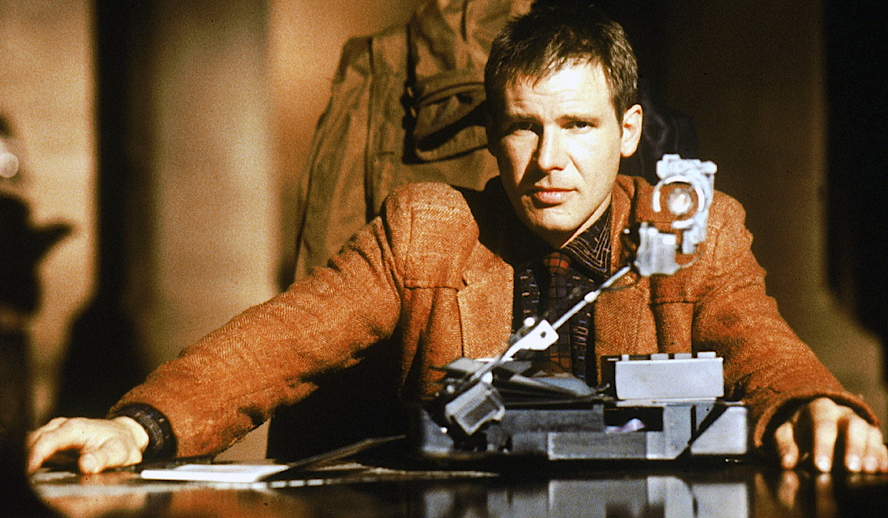Table of Contents

Photo: ‘Blade Runner’
From an Underdog to a Seminal Work of Science Fiction
Firstly, I would like to pop open this wine bottle — get a nice whiff of it, before we continue. Ahhh yes, 1982, good year, fine vintage. We got such genre classics as ‘E.T. the Extra-Terrestrial’, ‘The Thing’, ‘Poltergeist’, ‘Creepshow’, ‘Star Trek II: The Wrath of Khan’, and ‘Blade Runner.’ Of course, not all movies that are considered classics now were received as such initially; ‘The Thing’ was often derided in reviews as pointless and grotesque, and ‘Blade Runner’ had to go through a similar metamorphosis before it could have its share of glory. Really, there were signs that world-famous director Ridley Scott’s third feature would be a disaster, from its torturous post-production process to its inflated budget (for an R-rated “esoteric” sci-fi movie), and indeed, the film was neither a critical nor commercial success.
Related article: OSCAR-NOMINATED – EXCLUSIVE: ‘Dune’ Full Commentary, Reactions, Making Of – Timothee Chalamet, Zendaya, Oscar Isaac
Related article: OSCAR-NOMINATED – ‘House of Gucci’ Full Commentary & Behind the Scenes – Lady Gaga, Adam Driver, Jared Leto, Al Pacino
Related article: OSCAR-NOMINATED – ‘Belfast’ Full Commentary & BTS – Jamie Dornan, Caitriona Balfe, Judi Dench
Related article: OSCAR-NOMINATED – ‘West Side Story’ Full Commentary – Rita Moreno, Steven Spielberg, Rachel Zegler
Related article: OSCAR-NOMINATED – ‘No Time to Die’ Full Commentary, Behind the Scenes & Reactions, Daniel Craig, Rami Malek, Bond
Time works in mysterious ways, though, and in the four decades since ‘Blade Runner’ hit theaters, it has become nothing short of a benchmark for visually striking Cinema. While modern blockbusters like ‘Inception’, ‘Gravity’, and ‘Mad Max: Fury Road’ are unquestionably dazzling in their aesthetics, and well-deserving of their awards, there was simply nothing quite like ‘Blade Runner’ when it was released. Ridley Scott had toyed with the power of visual storytelling before, with ‘Alien’ retaining its fear-factor if you were to watch it without any audio, ‘Blade Runner’ would turn out to be by far the more ambitious venture. At the time, you would have been hard-pressed to find a sci-fi film noir hybrid that not only preceded ‘Blade Runner’, but went toe-to-toe with it on an aesthetic level. The funny thing is that nowadays, it’s terribly easy to find movies and TV shows that not only have ‘Blade Runner’ in their DNA but even surpass it in some regards.
This article contains plot spoilers for ‘Blade Runner’ and Do Androids Dream of Electric Sheep?
No Story Could Be Simpler: Meaning and Ambiguity
Despite being so foundational, ‘Blade Runner’ itself is not an original property; it was adapted from the novel Do Androids Dream of Electric Sheep?, by Philip K. Dick, with the screenplay by Hampton Fancher and David Peoples. The novel is a surreal nightmare — a trip into a dying world where animal life has become so scarce that a real cat is worth a great deal of money, and owning a real animal (as opposed to a robotic one) is considered a status symbol. Rick Deckard, the protagonist in both book and film (played by Harrison Ford), hunts down a group of androids that have gone rogue; Deckard is a bounty hunter in the novel and a “blade runner” in the film, and the androids’ film counterparts are called “replicants.”
Related article: EVOLUTION: Every Henry Cavill Role From 2001 to 2021, All Performances Exceptionally Poignant
Related article: EVOLUTION: Every Chris Evans Role From 1997 to 2020, All Performances Exceptionally Poignant
In the novel, Deckard hunts the androids so that he can get enough money to buy a real animal; in the film, he is roped into it by his former boss, to fulfill “one last job” — an old chestnut in film noirs. The film, more so than the novel, plays into film noir cliches, but breathes new life into them by transplanting them to such a richly texture world as a dystopian Los Angeles, in the futuristic year of 2019.
The plot of ‘Blade Runner’ is greatly streamlined compared to that of the source material; Deckard is tasked with taking out four replicants, with a conspiracy involving the Tyrell Corporation (the company responsible for the latest replicant models), as well as a subplot involving J. F. Sebastian, a genetic designer who works for Tyrell. The Tyrell Corporation has apparently been tinkering with memory implants for replicants, making them believe they’re human by giving them fabricated memories; Rachael, Deckard’s love interest (more of a straight-up femme fatale in the novel), is one such replicant.
The whole plot has Deckard tracking down four replicants — and possibly having to kill a fifth; it’s pretty straightforward, when you get down to it. What’s amazing is that ‘Blade Runner’ manages to be one of the most intensely analyzed and scrutinized films in the past half-century, for all of its on-paper simplicity. It’s a film that imbues meaning by asking questions and rarely answering them, not helped by the fact that the different cuts of the movie carry different implications.
Related article: #metoo Revolution: Powerful Questions That Need Answers
Related article: FACT-CHECKED Series: Timothee Chalamet and 32 Facts about The Young Superstar
The Many Versions (and Imperfections) of ‘Blade Runner’
The question as to what’s the “correct” cut of ‘Blade Runner’ is a topic of heated debate, one that has been raging since at least the so-called Director’s Cut (a misnomer, as will be explained) was released in 1992. There are so many different cuts of ‘Blade Runner’ that the very subject of the cuts has its own Wikipedia page; as you can imagine, this is quite daunting. However, for this article, I’ll be mainly referring to the two biggest cuts: the theatrical cut and the Final Cut. The aforementioned Director’s Cut was not actually supervised by Ridley Scott (although he did send notes to the cut’s team), and so is not a true director’s cut; the real director’s cut is the Final Cut, released in 2007 and with Scott’s direct involvement. The theatrical cut is what audiences would have seen in theaters in 1982, but it must be said that this alone does not constitute one of the greatest films ever made.
The theatrical cut of ‘Blade Runner’ has its share of glaring issues, the most immediate of them being Harrison Ford’s dreadful voice-over narration, in a movie that wasn’t supposed to have any. While voice-over narration is a common thread in film noirs (especially old-school film noirs), Deckard’s lines here are virtually always gratuitous, sometimes coming in at inopportune times, and Ford’s delivery could be best described as horrendously stilted. The other most apparent addition unique to the theatrical cut is the ending, which is inexplicably and unbelievably upbeat, with Deckard and Rachael driving through what seems to be a not-polluted countryside. Both the Director’s Cut and the Final Cut do away with the narration, as well as the happy ending; the Final Cut is basically a refined version of the Director’s Cut, with certain shots lengthened or shortened, and some subtle CGI to polish certain VFX shots.
Related article: MUST WATCH – The Hollywood Insider’s CEO Pritan Ambroase’s Love Letter to Black Lives Matter – VIDEO
Subscribe to The Hollywood Insider’s YouTube Channel, by clicking here.
The Final Cut of ‘Blade Runner’ was intended by Scott to be the definitive version of the film, and newcomers will probably watch it first when exploring the film’s vast depths — however, there is a caveat. The question of whether Deckard is himself a replicant is immensely controversial, and it’s all but impossible to discuss the merits of ‘Blade Runner’ without bringing up which interpretation is “canon.” Hampton Fancher and David People envisioned Deckard as being human, and author Philip K. Dick had explicitly made Deckard human in the novel. Ridley Scott, however, has been adamant about Deckard being a replicant — a perspective that’s apparent in the Final Cut. Personally, I don’t think it makes any sense for Deckard to be a replicant; I think it clashes with the character arc of Deckard rediscovering his humanity as the plot progresses, and I think it raises unwanted logistical questions about Deckard’s backstory.
Sounds and Visions of the Future: Setting a New Standard
While the waters of the plot are muddy, no matter which cut you watch, the aesthetic of ‘Blade Runner’ is undeniably top-tier — and probably stands as the movie’s most persistent achievement. Where to begin? It shouldn’t come as a surprise that ‘Blade Runner’ received Oscar nominations for production design and special effects. Imagine you are given the unenviable task of having to realize a futuristic incarnation of a recognizable American city; you can add flying cars, some extra neon lights, a few sci-fi chestnuts like that — but your vision has to also be believable enough to not seem horribly dated in a few decades. We didn’t get flying cars by 2019, but the L.A. of ‘Blade Runner’ feels like it could exist, with its dark alleys, its ramen shops, the glow-stick umbrella poles in the rain, the advertisements that take up entire buildings’ sides; the severe air pollution certainly feels like the logical conclusion of current-day L.A.’s atmosphere.
Limited Time Offer – FREE Subscription to The Hollywood Insider
The world of ‘Blade Runner’, simply on a visual level, feels like an actually lived-in place, but the visuals alone would only be able to carry the movie so far — if not for arguably its single finest asset: Vangelis’s score. Vangelis was already a widely respected composer in 1982, having just won an Oscar for his work on ‘Chariots of Fire’, but it’s his music for ‘Blade Runner’ that would serve as the very highest point of his career. (Not to toot my own horn, but I have the film’s score on CD — it is that good.) The music for ‘Blade Runner’, much like that of many film noirs before it, is heavily jazz-influenced, with soft horns and piano that lean toward the “cooler” side of the genre; the kicker, in typical Vangelis fashion, is the addition of synthesizers, which give the otherwise-traditional jazz compositions a kind of cyberpunk flare. ‘Blade Runner’ would become a major precursor to the cyberpunk movement (preceding, and in some ways anticipating, William Gibson’s Neuromancer by two years), and I suspect the score on its own proved deeply inspirational.
Portraits of Its Children: After and Beyond ‘Blade Runner’
The influence of ‘Blade Runner’ is hard to overstate; there are works of art, across just about any medium you can think of, that at least implicitly take after ‘Blade Runner’, if not reference it explicitly. It’s telling about the degree of this film’s influence that such genre-defining works as ‘The Matrix’ and ‘Akira’ unmistakably take visual cues from ‘Blade Runner’; in fact, if a sci-fi movie or TV show (released after, say, 1985) features a rain-drenched city where the sun never shines, it’s very likely paying homage to ‘Blade Runner.’ The ripples caused by ‘Blade Runner’ can be seen in Cinema, live-action TV, anime, video games, literature, and so on — to the point where some of its progeny have become seminal works in their own right, having even outclassed ‘Blade Runner’ in terms of overall quality.
Related article: The Hollywood Insider’s CEO Pritan Ambroase: “The Importance of Venice Film Festival as the Protector of Cinema”
Related article: The Masters of Cinema Archives: The Hollywood Insider Pays Tribute to ‘La Vie En Rose’, Exclusive Interview with Director Olivier Dahan
Related article: – Want GUARANTEED SUCCESS? Remove these ten words from your vocabulary| Transform your life INSTANTLY
The problem with ‘Blade Runner’ today is that it is probably no longer a mind-blowing experience for newcomers, nor is it a finely-tuned work of art; it has become a victim of its own belated success. The truth about ‘Blade Runner’ is that it’s a trailblazer, one of the few truly innovative sci-fi films in the past 40 years — but it’s also thinly plotted, slow-paced, occasionally misogynistic, given to logical inconsistencies, and just not as fun as many of its descendants.
As a historical artifact, however, and purely as a feat of style, ‘Blade Runner’ is nothing short of essential; you would be doing yourself a disservice if you skip it.
‘Blade Runner’ is available to stream on HBO Max.
By Brian Collins
Click here to read The Hollywood Insider’s CEO Pritan Ambroase’s love letter to Cinema, TV and Media. An excerpt from the love letter: The Hollywood Insider’s CEO/editor-in-chief Pritan Ambroase affirms, “We have the space and time for all your stories, no matter who/what/where you are. Media/Cinema/TV have a responsibility to better the world and The Hollywood Insider will continue to do so. Talent, diversity and authenticity matter in Cinema/TV, media and storytelling. In fact, I reckon that we should announce “talent-diversity-authenticity-storytelling-Cinema-Oscars-Academy-Awards” as synonyms of each other. We show respect to talent and stories regardless of their skin color, race, gender, sexuality, religion, nationality, etc., thus allowing authenticity into this system just by something as simple as accepting and showing respect to the human species’ factual diversity. We become greater just by respecting and appreciating talent in all its shapes, sizes, and forms. Award winners, which includes nominees, must be chosen on the greatness of their talent ALONE.
I am sure I am speaking for a multitude of Cinema lovers all over the world when I speak of the following sentiments that this medium of art has blessed me with. Cinema taught me about our world, at times in English and at times through the beautiful one-inch bar of subtitles. I learned from the stories in the global movies that we are all alike across all borders. Remember that one of the best symbols of many great civilizations and their prosperity has been the art they have left behind. This art can be in the form of paintings, sculptures, architecture, writings, inventions, etc. For our modern society, Cinema happens to be one of them. Cinema is more than just a form of entertainment, it is an integral part of society. I love the world uniting, be it for Cinema, TV. media, art, fashion, sport, etc. Please keep this going full speed.”
More Interesting Stories From The Hollywood Insider
– Want GUARANTEED SUCCESS? Remove these ten words from your vocabulary| Transform your life INSTANTLY
– A Tribute to Martin Scorsese: A Complete Analysis of the Life and Career of the Man Who Lives and Breathes Cinema
– Do you know the hidden messages in ‘Call Me By Your Name’? Find out behind the scenes facts in the full commentary and In-depth analysis of the cinematic masterpiece
– A Tribute To The Academy Awards: All Best Actor/Actress Speeches From The Beginning Of Oscars 1929-2019 | From Rami Malek, Leonardo DiCaprio To Denzel Washington, Halle Berry & Beyond | From Olivia Colman, Meryl Streep To Bette Davis & Beyond
– In the 32nd Year Of His Career, Keanu Reeves’ Face Continues To Reign After Launching Movies Earning Over $4.3 Billion In Total – “John Wick”, “Toy Story 4”, “Matrix”, And Many More
blade runner, blade runner, blade runner, blade runner, blade runner, blade runner, blade runner, blade runner, blade runner, blade runner, blade runner, blade runner, blade runner, blade runner, blade runner, blade runner, blade runner, blade runner, blade runner, blade runner, blade runner, blade runner









